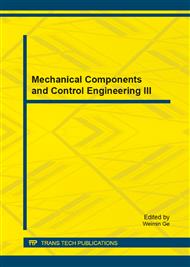p.1138
p.1143
p.1147
p.1152
p.1157
p.1162
p.1166
p.1170
p.1174
A Novel Denoising Method Based on Ensemble Empirical Mode Decomposition – Principle Component Analysis
Abstract:
Equipment performance degradation model is a key component in its diagnosis and prognosis models. As to slewing bearing, vibration signals are usually non-stationary and with strong white noise, which makes it very difficult to extract useful information from the signals. Therefore, an Ensemble Empirical Mode Decomposition – Principle Component Analysis (EEMD - PCA) based method was proposed to denoise the vibration signals and performance degradation model was established by PCA. To verify the proposed method, an experiment was conducted and the life cycle vibration signals were acquired. After denoising, performance degradation model was established to explain the denoising performance. Results show that the proposed method acquired a better denoising performance than EEMD-MSPCA, which provides a potential for further research.
Info:
Periodical:
Pages:
1157-1161
Citation:
Online since:
October 2014
Authors:
Price:
Сopyright:
© 2014 Trans Tech Publications Ltd. All Rights Reserved
Share:
Citation:


